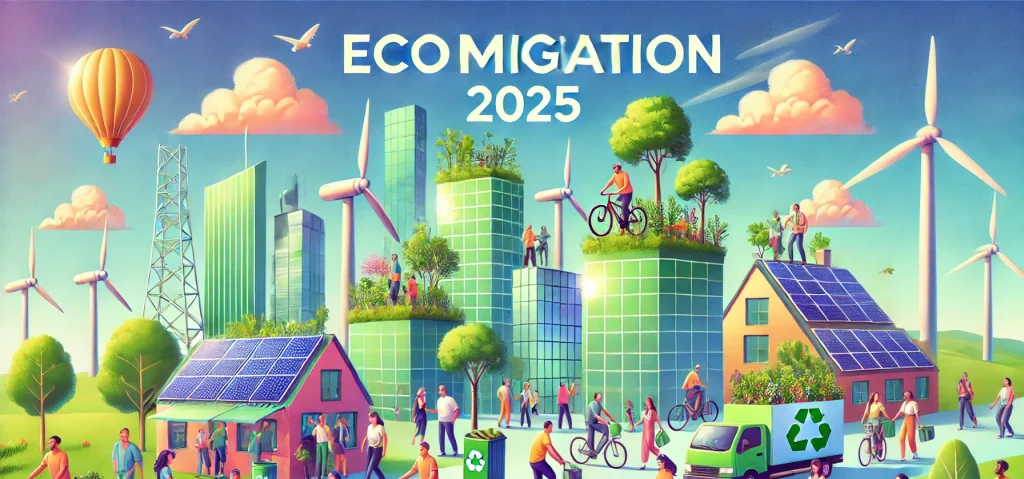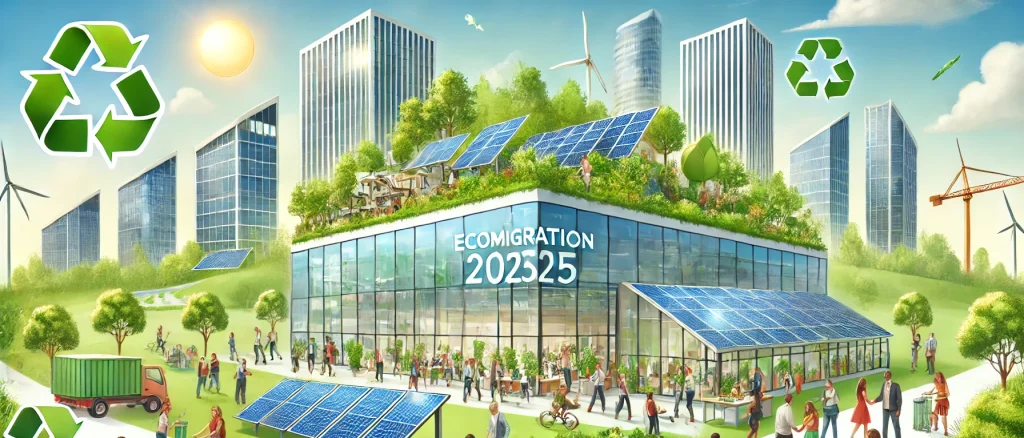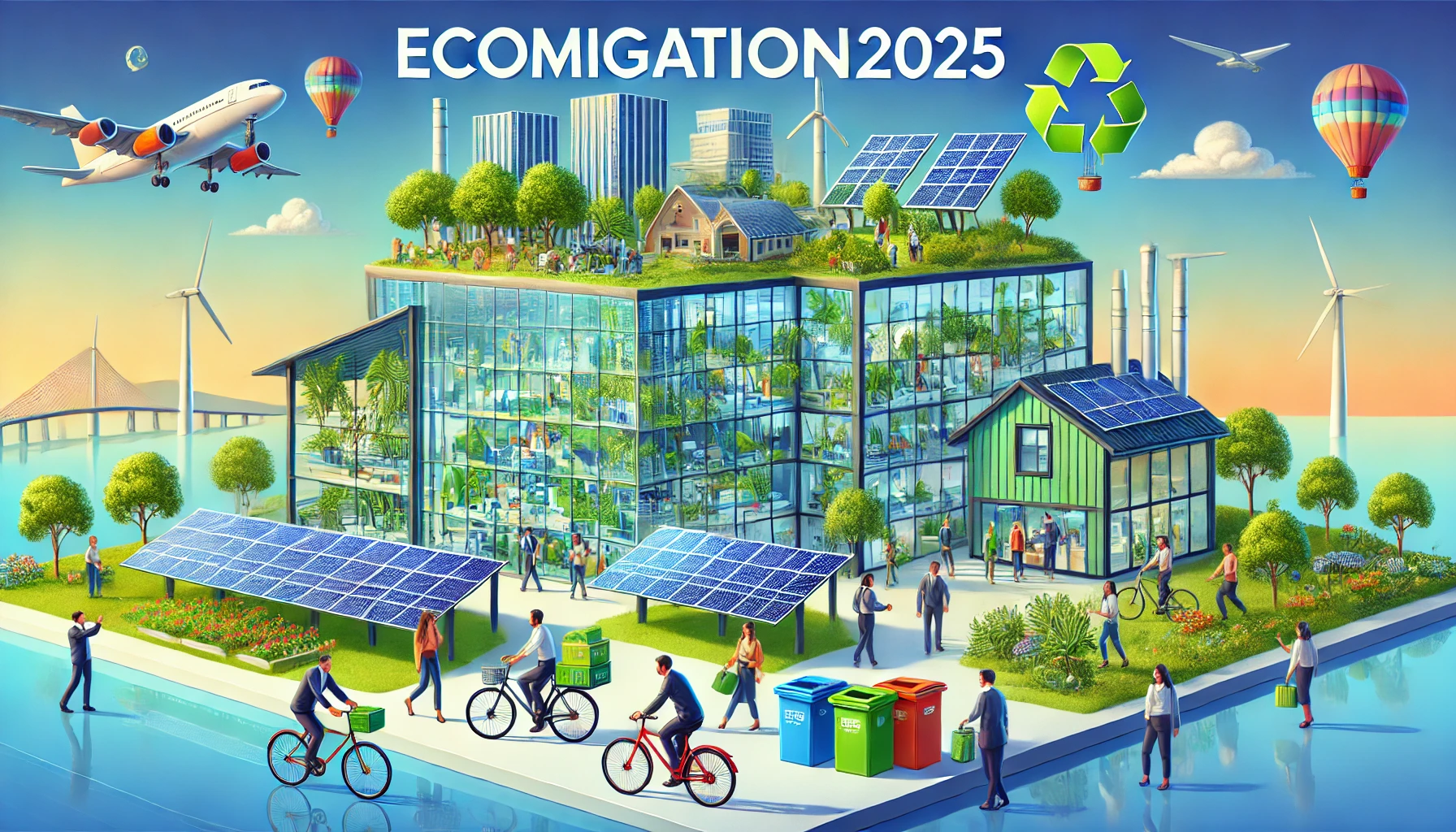Introduction on EcoMigration2025
Imagine living in a world where everyone helps protect the environment, making sure our planet stays healthy for future generations. This is the goal of EcoMigration2025, a project that encourages people and communities to live sustainably. But what does “sustainably” mean, and why is it important? Let’s dive in and find out!
What is EcoMigration2025?
EcoMigration2025 is a global initiative aiming to promote eco-friendly living. It encourages people to reduce their carbon footprint, conserve resources, and use renewable energy. This project is important because it helps fight climate change and ensures a better future for everyone.
Key Goals of EcoMigration2025
- Reduce Carbon Footprint: Encouraging people to lower their greenhouse gas emissions.
- Promote Renewable Energy: Supporting the use of solar, wind, and other renewable energy sources.
- Conserve Natural Resources: Teaching people how to use water, energy, and other resources more wisely.
- Support Green Technology: Encouraging the development and use of technology that is good for the environment.
Why is Sustainable Living Important?
Sustainable living means making choices that are good for the environment. When we live sustainably, we help protect our planet. Here are a few reasons why sustainable living is so important:
- Protects Natural Resources: Using resources like water and energy wisely ensures they are available for future generations.
- Reduces Pollution: Sustainable practices help reduce waste and pollution, leading to cleaner air and water.
- Fights Climate Change: Reducing our carbon footprint helps slow down global warming.
How Can We Live Sustainably?
Living sustainably involves making small changes that have a big impact. Here are some easy ways to start:
- Reduce, Reuse, Recycle: Cut down on waste by recycling and reusing items.
- Save Energy: Use energy-efficient appliances and switch to renewable energy sources like solar or wind power.
- Conserve Water: Fix leaks, take shorter showers, and use water-saving fixtures.
- Choose Eco-Friendly Products: Buy products made from sustainable materials and those with minimal packaging.
- Grow Your Food: Planting a garden can reduce the need for transportation and packaging of food items.
The Role of Renewable Energy
Renewable energy is a key part of EcoMigration2025. Renewable energy comes from sources that can be replenished naturally, like the sun, wind, and water. Using renewable energy has many benefits:
- Reduces Greenhouse Gas Emissions: Renewable energy sources produce few greenhouse gases.
- Decreases Reliance on Fossil Fuels: Fossil fuels like coal and oil harm the environment. Renewable energy provides a cleaner alternative.
- Creates Jobs: The renewable energy sector offers many job opportunities.
Types of Renewable Energy
- Solar Power: Energy from the sun can generate electricity and heat.
- Wind Power: Wind turbines convert wind energy into electricity.
- Hydropower: Energy from moving water can be used to generate electricity.
Climate Change Solutions
Climate change is one of the biggest challenges we face today. To combat it, we need to adopt various climate change solutions, many of which are part of EcoMigration2025. These solutions include:
- Planting Trees: Trees absorb carbon dioxide and release oxygen, helping to clean the air.
- Energy Efficiency: Improving energy efficiency in homes, buildings, and transportation reduces energy consumption and emissions.
- Sustainable Agriculture: Practices like crop rotation and organic farming can make agriculture more sustainable.
Practical Climate Change Solutions
- Electric Vehicles (EVs): EVs produce no tailpipe emissions and are more energy-efficient than traditional gasoline vehicles.
- Smart Grids: Advanced electrical grids that optimize the delivery and use of electricity.
- Waste-to-Energy: Technologies that convert waste materials into usable energy help reduce landfill waste and generate power.
Green Technology and Innovation

Green technology refers to new and innovative technologies that protect the environment. EcoMigration2025 encourages the development and use of green technology. Here are some examples:
- Electric Vehicles (EVs): EVs are more energy-efficient and produce no emissions.
- Smart Grids: These grids help optimize electricity delivery and use, reducing waste.
- Waste-to-Energy: Converting waste into energy reduces landfill waste and generates power.
Getting Involved in EcoMigration2025
Anyone can participate in EcoMigration2025! Here are some ways you can get involved:
- Educate Yourself and Others: Learn about sustainable living and share your knowledge with friends and family.
- Support Eco-Friendly Policies: Advocate for policies that promote renewable energy, conservation, and sustainability.
- Volunteer: Join local environmental groups and participate in community clean-up events, tree planting, and other eco-friendly activities.
EcoMigration2025 is a movement towards a greener, more sustainable future. By adopting eco-friendly practices, promoting renewable energy, and supporting green technology, we can all play a part in protecting our planet. Let’s work together to make our world a better place for everyone!
Further Reading
GET MORE KNOWLEGDE ON: GreenFutureScholarship: Scholarship on Technology
For more information on sustainable living, check out these resources:
Sure, let’s continue expanding on the key points of the article, adding more details, examples, and interactive elements to engage a 7th-grade audience.
Eco-Friendly Transportation
Transportation is a significant contributor to greenhouse gas emissions. However, eco-friendly transportation options are becoming more popular and accessible. Here are some examples:
Bicycles
Riding a bicycle is a great way to reduce your carbon footprint. It doesn’t produce emissions, and it’s also a healthy exercise. Many cities now have bike-sharing programs, making it easy for everyone to use bicycles.
Public Transportation
Using buses, trains, and subways reduces the number of cars on the road, which decreases pollution. Public transportation systems are becoming more efficient and eco-friendly, with many cities investing in electric buses and other green technologies.
Carpooling
Carpooling with friends or colleagues can significantly reduce the number of vehicles on the road, leading to fewer emissions. It’s also a great way to save money on fuel and reduce traffic congestion.
Electric Vehicles (EVs)
Electric vehicles are becoming more popular as technology improves and prices decrease. EVs produce no tailpipe emissions and can be powered by renewable energy sources. Companies like Tesla, Nissan, and Chevrolet are leading the way in producing affordable and efficient electric cars.
Walking
For short distances, walking is the best option. It’s free, healthy, and produces no emissions. Communities can support walking by creating safe and accessible sidewalks and pedestrian pathways.
The Importance of Water Conservation
Water is a precious resource, and conserving it is crucial for sustainable living. Here are some tips on how to save water at home:
- Fix Leaks: A small drip from a leaky faucet can waste gallons of water. Fixing leaks promptly can save a lot of water.
- Take Shorter Showers: Reducing shower time can save a significant amount of water. Consider using a timer to keep track.
- Use Water-Efficient Fixtures: Installing low-flow showerheads and faucets can reduce water usage without sacrificing performance.
- Turn Off the Tap: Don’t leave the water running while brushing your teeth or washing dishes. Turn it off when not in use.
- Collect Rainwater: Use rain barrels to collect rainwater for watering plants and gardens.
Waste Reduction and Recycling

Reducing waste is a key aspect of sustainable living. Here are some ways to minimize waste:
Reduce
The first step is to reduce the amount of waste you produce. Avoid single-use plastics and opt for reusable items like shopping bags, water bottles, and food containers.
Reuse
Before throwing something away, think about how it can be reused. For example, glass jars can be used for storage, and old clothes can be turned into rags or donated.
Recycle
Recycling helps reduce the amount of waste that ends up in landfills. Make sure to recycle paper, cardboard, glass, and certain plastics. Check your local recycling guidelines to know what can and cannot be recycled.
Compost
Composting is a great way to recycle organic waste like food scraps and yard waste. Compost enriches the soil and reduces the need for chemical fertilizers.
The Power of Community Action
Community action is vital in driving the success of initiatives like EcoMigration2025. When communities come together to support sustainable practices, the impact is significant. Here are some ways communities can make a difference:
Community Gardens
Community gardens provide a space for people to grow their food, reducing the need for transportation and packaging. They also promote healthy eating and strengthen community bonds.
Environmental Education
Educating the community about the importance of sustainability and how to live eco-friendly lives is crucial. Schools, community centers, and local organizations can host workshops, seminars, and events to spread awareness.
Clean-Up Campaigns
Organizing community clean-up events helps keep neighborhoods clean and reduces pollution. These events can focus on local parks, beaches, or streets and often involve removing litter and planting trees.
Supporting Local Businesses
Supporting local businesses, especially those that prioritize sustainability, can reduce the environmental impact of transportation and promote the local economy. Look for farmers’ markets, eco-friendly shops, and local artisans.
Inspiring Stories of Change
Here are a few inspiring stories of individuals and communities making a difference through sustainable living and environmental stewardship:
The Green School in Bali
The Green School in Bali, Indonesia, is a perfect example of sustainable education. The school is built entirely from bamboo and other sustainable materials. It uses renewable energy sources like solar and hydro power and teaches students about sustainability through hands-on learning experiences.
The City of Copenhagen
Copenhagen, the capital of Denmark, is known for its commitment to sustainability. The city aims to become carbon neutral by 2025. Copenhagen has invested heavily in bicycle infrastructure, renewable energy, and green buildings. As a result, it is one of the greenest cities in the world.
The Zero Waste Family
The Johnson family, known as the “Zero Waste Family,” has committed to living a zero-waste lifestyle. They produce very little trash by following the principles of reduce, reuse, recycle, and compost. Their story has inspired many people around the world to reduce their waste and live more sustainably.
How You Can Make a Difference
You don’t have to make big changes to have a big impact. Here are some simple actions you can take to support EcoMigration2025 and live more sustainably:
- Start Small: Begin with small changes like using reusable bags and water bottles.
- Educate Yourself: Learn more about sustainability and share your knowledge with others.
- Join a Community Group: Get involved in local environmental groups or initiatives.
- Advocate for Change: Support policies and practices that promote sustainability.
- Lead by Example: Show others how easy and rewarding it can be to live sustainably.
Conclusion
EcoMigration2025 is a call to action for all of us to move towards a greener, more sustainable future. By adopting eco-friendly practices, promoting renewable energy, and supporting green technology, we can make a significant difference. Every small step counts, and together, we can create a healthier planet for ourselves and future generations.
Additional Resources
For more information and ideas on how to live sustainably, check out these resources:
- Renewable Energy
- Sustainable Living Tips
- Green Technology Innovations
- The Green School in Bali
- Copenhagen’s Sustainability Initiatives
- Zero Waste Family
Conclusion
EcoMigration2025 is more than just a project; it is a movement that empowers individuals, communities, and nations to adopt sustainable living practices. By reducing our carbon footprint, conserving resources, and embracing renewable energy, we can make significant strides towards a healthier and more sustainable planet.
Living sustainably may seem challenging at first, but remember that every small action counts. Whether it’s recycling, conserving water, using public transportation, or supporting eco-friendly products, each step you take contributes to a larger global effort.
We all have a role to play in protecting our environment. By getting involved in initiatives like EcoMigration2025, we can inspire others and create a ripple effect of positive change. Let’s work together to ensure that future generations inherit a world where they can thrive in harmony with nature.
Call to Action
Join the EcoMigration2025 movement today! Start by making small changes in your daily life, educate yourself and others about sustainable living, and get involved in community efforts. Together, we can make a difference and create a brighter, greener future for all.

